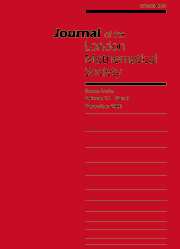No CrossRef data available.
Article contents
THE DERIVATION PROBLEM FOR GROUP ALGEBRAS OF CONNECTED LOCALLY COMPACT GROUPS
Published online by Cambridge University Press: 08 April 2017
Abstract
The derivation problem for a locally compact group G is to decide whether for each derivation D from L1(G) into L1(G) there is a bounded measure μ∈M(G) with D(a) = aμ−μa (a ∈ L1(G)). In this paper we obtain an affirmative answer for the case of connected groups. To explain the contents of this paper we give an equivalent formulation of the problem. Suppose that the group G acts as a group of homeomorphisms of the locally compact space X. Related to this there is an action of G on M(X). A bounded crossed homomorphism from G to M(X) is a map Φ with bounded range and satisfying Φ(gh) = gΦ(h)+Φ(g) (g, h ∈ G). The problem for bounded crossed homomorphisms is to decide if for each such Φ there is an element μ of M(X) with Φ(g) = gμ− μ (g ∈ G). The derivation problem is equivalent to this bounded crossed homomorphism problem for the special case X = G where G acts on X by conjugation (together with some mild continuity hypotheses about the map Φ:G→M(X) which are often automatically satisfied). The bounded crossed homomorphism problem always has a positive solution if G is amenable and a closely related calculation shows that in solving the bounded crossed homomorphism problem we need only solve it for functions Φ which are zero on H where H is a given amenable subgroup of G. It can happen that this condition of being zero on H forces Φ to be zero even when H is a comparatively small subgroup of G. If h is an element of G such that ‘hnx → ∞’ as n → ∞ for all x ∈ X then for any two measures μ and ν, for large values of n, μ and hnν have little overlap so ∥μ + hNν∥ → ∥μ∥ + ∥ν∥. Thus if H is the subgroup generated by h, for any g ∈ G
- Type
- Notes and Papers
- Information
- Copyright
- The London Mathematical Society 2001



